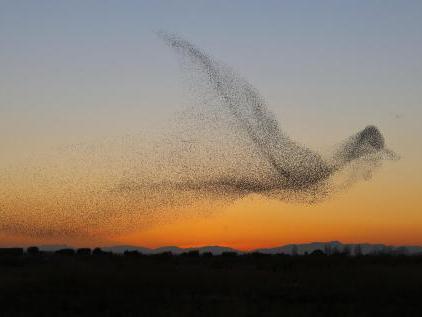Award-winning image shows murmuration of starlings in shape of giant bird

Your support helps us to tell the story
From reproductive rights to climate change to Big Tech, The Independent is on the ground when the story is developing. Whether it's investigating the financials of Elon Musk's pro-Trump PAC or producing our latest documentary, 'The A Word', which shines a light on the American women fighting for reproductive rights, we know how important it is to parse out the facts from the messaging.
At such a critical moment in US history, we need reporters on the ground. Your donation allows us to keep sending journalists to speak to both sides of the story.
The Independent is trusted by Americans across the entire political spectrum. And unlike many other quality news outlets, we choose not to lock Americans out of our reporting and analysis with paywalls. We believe quality journalism should be available to everyone, paid for by those who can afford it.
Your support makes all the difference.This is the mesmerising moment a murmuration of starlings took the form of a giant bird while being targeted by a bird of prey.
Daniel Biber, 53, captured the breathtaking snap after observing thousands of birds and scouting locations over a four-day period.
Like clouds in the sky, the giant flocks often take on weird and wonderful - and sometimes graphic - moving forms and shapes.
And the birds made for a startling spectacle when they assembled over the Costa Brava in northeastern Spain in front of Mr Biber's eyes.
He managed to take a series of images which show the birds merging into the shape of a giant bird when they were targeted by a predator.
And the unique snap has since earned him the top prize in an international photography competition.
But Mr Biber said he only realised his luck once he reviewed the photographs on his computer.
He said: "I was taking pictures of the murmurations over several days.
"Only when I checked the pictures on the computer later, I realised what formation the starlings had created.
"I was so concentrated on taking pictures at the time that I hadn't realised that the starlings had created a giant bird in the sky.
"It took less than 10 seconds for the birds to create that formation.
"I realised that I had captured a unique snapshot, technically, sharp and in high quality."
Mr Biber lives in Hilzingen, Germany, and now runs a bicycle business following his career as an aerospace engineer.
He has been taking pictures since 1981 when he started off with his first reflex camera and has been taking digital snaps since 2008.
Mr Biber has visited the northeast of Spain for a number of years and knew about the fascinating display that starlings put on.
But he said it took him four days to capture the unique moment after he had to scout out locations and get the lighting right.
Mr Biber added: "I always have at least one camera on me whenever I leave the house.
"And I go on regular holidays to northeastern Spain where I have witnessed fantastic murmurations of starlings over the years.
"I've tried to photograph the starlings but it never worked out as well as I hoped for.
"I eventually drove to the spot every day for four days in a row in order to capture them.
"I picked a spot where I thought they would turn up and picked a matching foreground and backdrop in order to put them in scene.
"It usually happens that birds of prey turn up and the starlings then create bizarre forms. It can be quite erratic and completely random.
"Sometimes it's fantasy formations which are then interpreted by our brain.
"A number of people were watching this display but they were observing it from other spots and might not have seen what I captured."
The images were submitted to an international photography run by the bird observatory Vogelwarte Sempbach in Switzerland.
Organisers received 6,800 images for their 2017 competition which had been submitted by 540 photographers from 15 countries.
Mr Biber, a semi-professional photographer, won the competition and has since had requests from experts who use his images to prove the difference between real and doctored images.
He has also had requests from museums about a potential exhibition next year.
SWNS
Subscribe to Independent Premium to bookmark this article
Want to bookmark your favourite articles and stories to read or reference later? Start your Independent Premium subscription today.
Join our commenting forum
Join thought-provoking conversations, follow other Independent readers and see their replies
Comments